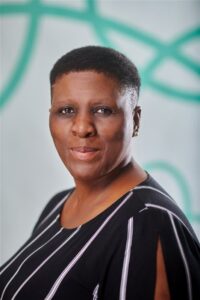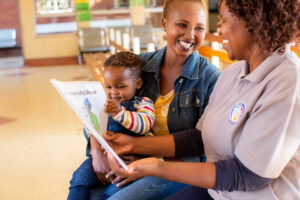No More Words: Time for Action and Deeper Global Collaboration for Community Health Workers
No More Words: Time for Action and Deeper Global Collaboration for Community Health Workers
By Babalwa Mbono, Strategic Projects Officer, mothers2mothers
This post was originally published on the Frontline Health Workers Coalition Blog.

Babalwa Mbono, Strategic Project Officer and former mothers2mothers Mentor Mother
We all have, or will, experience a moment in our life when we decide and realise that health is the cornerstone to everything we do and want to achieve. Mine was in 2000, when I took a step to know my HIV status.
I have been reminiscing about that time ahead of World Health Day on April 7th, for which the theme this year is ‘My health, my right.’ What helped me deal with my life-changing positive diagnosis, was the community that supported me—close family, colleagues, peers. They helped me through the most challenging period of my life and to realise my right to a healthy future.
But let’s be real—we are a long way from everyone enjoying this right and support. Approximately 615 million Africans cannot access even the most basic of health services because of the lack of availability and resources (human and material), investment, and infrastructure. Although at least 140 countries recognise health as a human right in their constitutions, only four countries have mentioned how to finance it—and there lies the crux of the problem.
Too many words. Not enough concrete global and national action aligned to realities on the ground and joined up, collective effort from policymakers to truly leave no one behind.
I have worked on the frontlines of health care, and I know that there is a proven, effective solution to help people realize their right to health. It is paid, professional female community health workers. At mothers2mothers (m2m), we’ve showed what happens when we take action. Our peer-based and community-led model of training, paying, and investing in local female community health workers (CHWs) has had a ripple effect of care and well-being for millions of my peers.
The team of m2m CHWs, known as Mentor Mothers, has reached more than with critical health services across a dozen African nations since 2001. We have achieved virtual elimination of transmission of HIV from mother to baby among our enrolled clients for nine years in a row, and have helped to keep over two million at risk women and children alive.
m2m is not an isolated example. Evidence shows that CHWs are a critical resource in helping turn the tide on some of our biggest health challenges. Since 2004, CHW involvement in HIV programs helped save an estimated 100 million children’s lives and cut AIDS-related deaths by 60%. CHWs are also addressing up to 50% of the malaria burden in countries globally.
Yet, too many CHWs are still unpaid, not formally recognised, or adequately supported. This is not only unethical, it is bad public health policymaking. Why? We know that CHWs are critical to primary health care—a model and foundation for health systems that will enable us to truly deliver universal health coverage.
I believe overcoming these three, inter-related challenges, will help unlock the full potential of CHWs and everyone’s right to health:
- Pay: Only 14% of CHWs in sub-Saharan Africa are salariedwith remuneration comes a sense of value, belonging, and a strong commitment to the work, which all leads to better impact.
- Recognition and accreditation: CHWs are often not recognised or certified, and certainly not in the same way across different countries. This is a real issue as recognition and accreditation offers a career path for health workers and helps policymakers with informed decisions, building a strong and sustainable foundation for health systems.
- Increased, aligned investment: Over 70% of African countries face critical staff shortages—with estimates showing that the African Region will need between 5.3 and 6.1 million additional health workers by 2030. But the continent is facing an annual financing gap toward community health of around $4.4 billion. We need to align financing with reality.
This is the reality today; but it doesn’t have to be the reality tomorrow. I truly believe that with proper collaboration and investment in CHWs, we can unlock historic human achievements—from an HIV-free generation to the elimination of malaria and tuberculosis and a dramatic reduction in maternal and child mortality.
Because health should be celebrated and held as sacred—a source and foundation for the opportunities and joys that life brings.
And as a global health community, our needs to deliver the urgent and much needed change for those who need it most. But our world is increasingly fragmented, with competing priorities and growing divisions that are diverting leaders from their commitment to the SDG roadmap and delivering health for all by 2030.
Now is not the time to take our eyes of the ball. We must make good on our promise to deliver health for all for current and future generations.
How? By driving and extending collaboration with, better apply pressure on leaders to take action to deliver on their promises for health workers, including community health workers. A salient and powerful example of that would be to fulfil the commitment made through the for CHWs, which was signed byof the CHW Symposium in Liberia a year ago.
Now is the time for us to really come together as a broader coalition and ensure policy translates into lasting change for our communities today and our unborn children tomorrow.






















